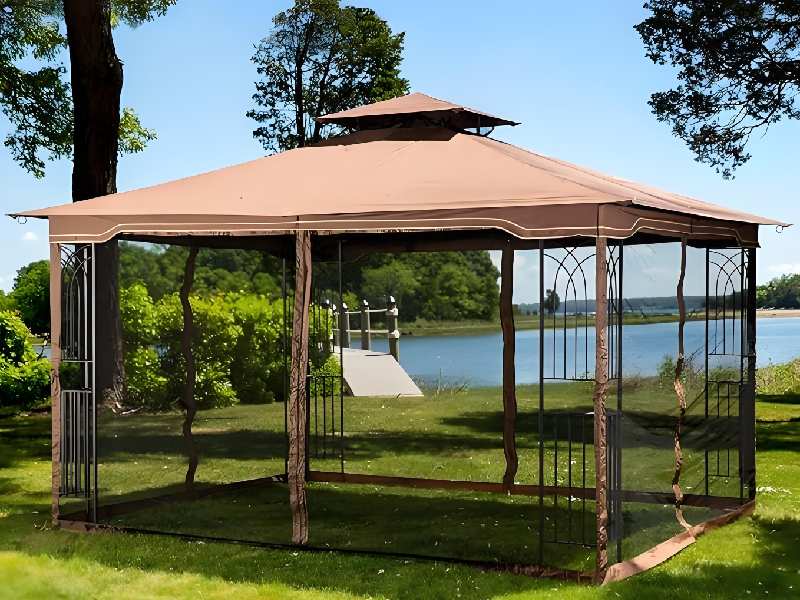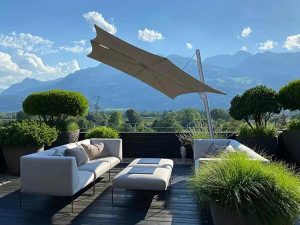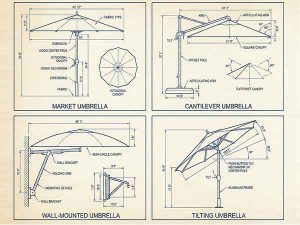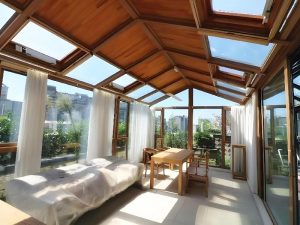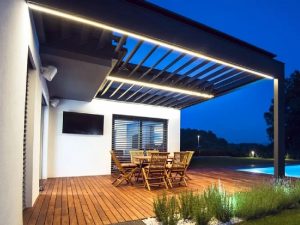Most of the southern United States experiences a humid subtropical climate—long, hot summers with high humidity and frequent rainfall. These conditions make the region a perfect breeding ground for mosquitoes. In states like Florida, Texas, and Louisiana, mosquito activity lasts nearly all year. In August, New Orleans confirmed its first neuroinvasive case of West Nile virus, a reminder that mosquito problems affect not only outdoor comfort but also public health and safety.

No matter where you live, backyard BBQs, family gatherings, and summer parties are a big part of life. But when evening falls, mosquitoes show up uninvited, making it hard to enjoy the moment.
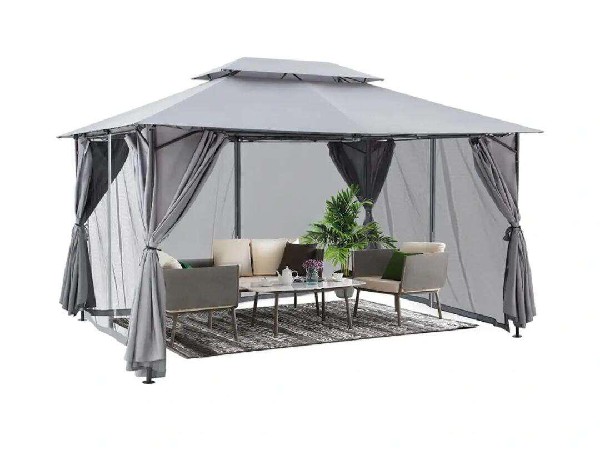
Compared with sprays or temporary nets, a gazebo with mosquito netting offers a longer-lasting and more comfortable solution. It provides shade and rain protection while keeping pesky insects out, so you can relax and entertain with peace of mind. In this guide, LIDA OUTDOOR will introduce three common types of gazebos with mosquito netting, helping you choose the best option for your backyard or business.
Don’t Miss: 10+ Types of Gazebos You Can Choose
3 Different Types of Gazebo with Mosquito Netting
Gazebos with mosquito netting come in different styles and structures, each suited to various needs—from casual daily use to long-term permanent setups. Below, LIDA OUTDOOR will walk you through three of the best options for keeping mosquitoes away.
1. Hard-Top Gazebo with Mosquito Netting
The hard-top gazebo is the best choice for long-term, fixed installation. Its frame is made of aluminum alloy or galvanized steel, with a roof covered in polycarbonate panels or steel sheets for maximum durability. Many models can withstand winds of 6–7 on the Beaufort scale (with certified designs reaching even higher). Paired with full mosquito netting on all sides, it not only blocks insects but also creates a shaded, rain-protected outdoor retreat.
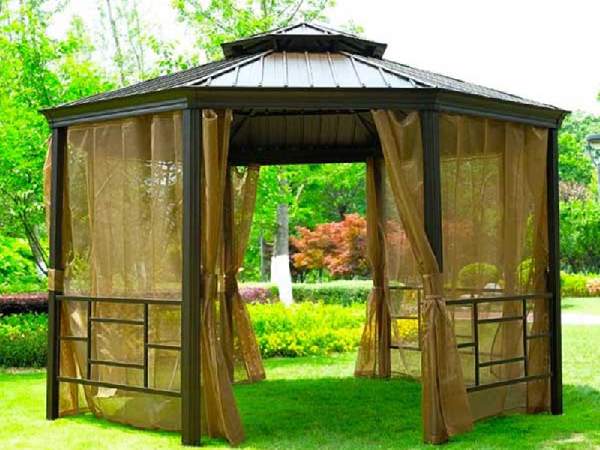
This type of gazebo is often seen as an upgraded “outdoor living room.” It elevates the style of your patio or garden and is perfect for hosting formal gatherings or special events. Thanks to its sturdy structure, it resists sun, rain, and even snow, offering strong protection and peace of mind without fear of tipping over. While installation is more complex, once set up, it serves as a beautiful and practical mosquito-free space you can enjoy year-round.
2. Soft-Top Gazebo with Mosquito Netting
The soft-top gazebo is arguably the most cost-effective option. It is more affordable than a hard-top but sturdier than a portable design. It can stay up safely in winds of 4–5 (28–38 km/h), though we recommend taking it down when winds reach level 6 or higher. Because it balances price and stability, this type is among the most popular choices for everyday backyard use.
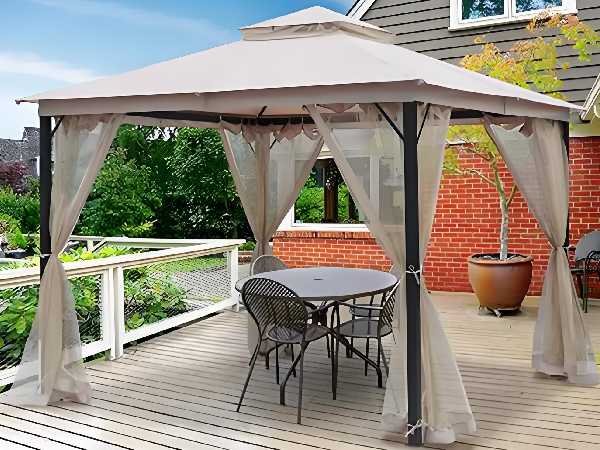
These gazebos usually feature a polyester or Oxford fabric canopy with mosquito netting around all sides. This design blocks harsh sunlight, shields against sudden rain, and maintains airflow while keeping insects out. Whether for an evening BBQ, a poolside hangout, or a children’s play area, a soft-top gazebo provides a safe and comfortable space. Another advantage is convenience—it’s easy to set up, dismantle, and store away during the off-season, making it ideal for frequent backyard use.
3. Pop-Up Gazebo with Mosquito Netting
The biggest advantage of a pop-up gazebo is flexibility. It sets up and folds down within minutes, making it ideal for temporary gatherings, picnics, or camping trips. With instant shade and mosquito protection, it ensures your outdoor activities stay comfortable and worry-free.
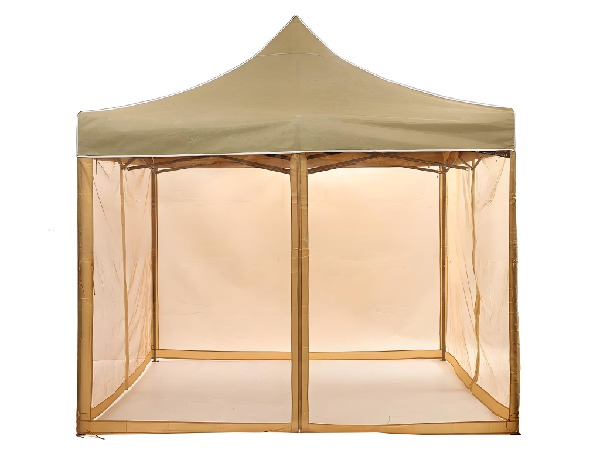
This type of gazebo features a lightweight fabric canopy and netting on all sides, creating a shaded, mosquito-free zone in just minutes. While it’s less stable and durable compared to a hard-top, its portability makes it a great choice. Easy to carry and store, it’s perfect for outdoor enthusiasts who love the freedom to set up a comfortable, bug-free space anytime, anywhere.
How to Choose the Best Gazebo with Mosquito Netting
Choosing a gazebo with mosquito netting is not just about style—it’s also about matching the product to your environment and needs. As mentioned earlier, in humid southern states where mosquitoes thrive, making the right choice is crucial. We recommend considering the following four factors.
1. Consider the Climate
Different climates place different demands on your gazebo. In hot, humid regions with heavy mosquito activity, choose fine-mesh, tear-resistant netting for effective protection. In rainy areas, look for waterproof materials and quick-drain roof designs. And in sunny regions, opt for UV-resistant fabrics to ensure comfort and durability over time.
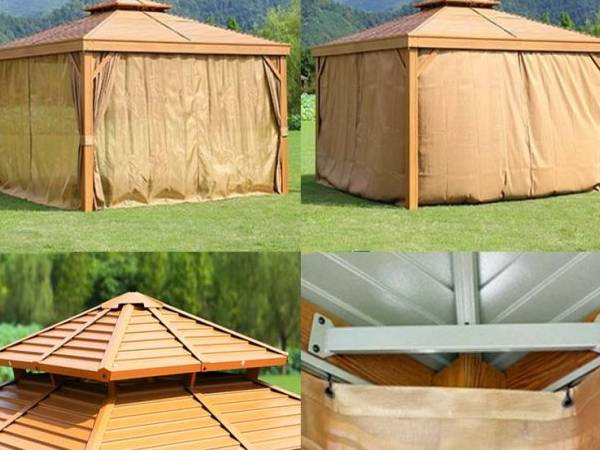
2. Consider the Purpose
Before buying, ask yourself whether you need a long-term or temporary solution.
For permanent setups on patios or in gardens, a hard-top gazebo is ideal. Its sturdy build offers reliable year-round protection. For short-term activities like weekend parties, picnics, or camping, a pop-up gazebo is more convenient since it sets up and folds down in minutes. A soft-top gazebo falls in between—suitable for frequent family use, yet easy to dismantle and store when needed, balancing cost and practicality.
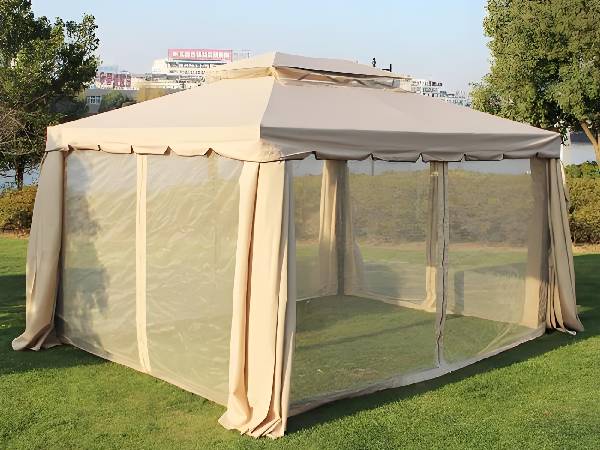
3. Consider Your Budget
Your budget often determines the type of gazebo you choose.
- Hard-top gazebos are the most expensive due to their sturdy structure and durable materials—ideal for those seeking a long-term investment.
- Soft-top gazebos strike a balance between price and performance, making them the best value choice.
- Pop-up gazebos are the most affordable, perfect for price-sensitive buyers or those who only need short-term or occasional use. When evaluating costs, don’t forget to factor in shipping, installation, and future maintenance to get a clearer picture of the total expense.
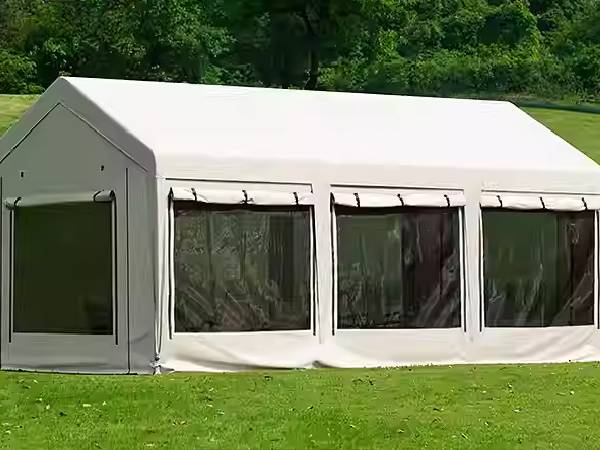
4. Consider the Supplier
If you’re an individual buyer, you can find gazebos with mosquito netting at local home improvement stores, online marketplaces, or big-box retailers. In this case, focus on product quality, warranties, and after-sales service.
If you are a wholesaler or distributor, supplier reliability is even more critical. Beyond product quality, you’ll need support with certifications, customization, and logistics.
For example, gazebos exported to Europe or the U.S. often require CE certification or wind resistance ratings. OEM/ODM customization—adjusting size, colors, mosquito netting styles, or adding curtains—can boost your competitiveness. And equally important, consistent supply and on-time delivery safeguard your long-term business.
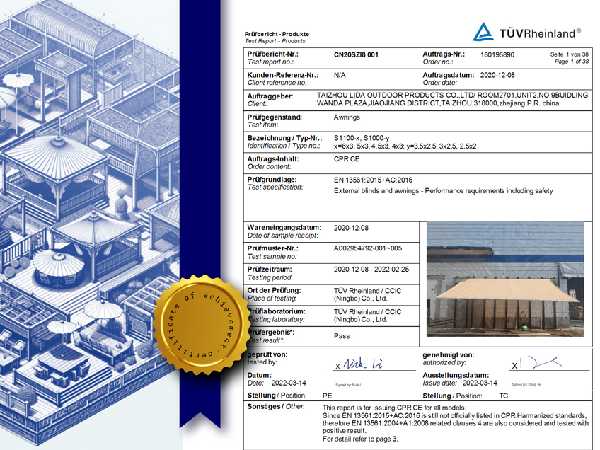
In these areas, LIDA OUTDOOR leverages years of manufacturing and export experience to provide clients with complete solutions. We hold strict international certifications and offer flexible customization to meet customer needs—whether it’s small trial orders or large-scale supply, we deliver efficiently. For this reason, LIDA OUTDOOR has become a trusted long-term partner for buyers worldwide.
Conclusion
A gazebo with mosquito netting is an excellent way to elevate your outdoor living experience. Whether you choose a hard-top, soft-top, or pop-up design, each type offers unique benefits. By considering climate, purpose, budget, and supplier, you can confidently find the option that suits your needs.
For wholesalers and distributors, LIDA OUTDOOR stands out as a reliable partner. We provide a wide range of gazebo options, flexible OEM/ODM customization, and dependable supply guarantees—helping you stay competitive and grow your business in the global gazebo market.

